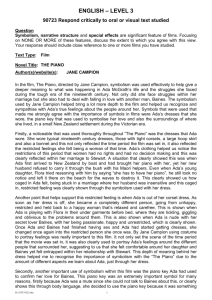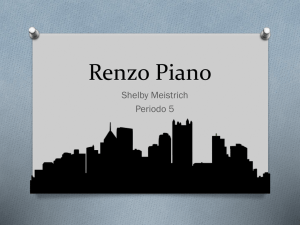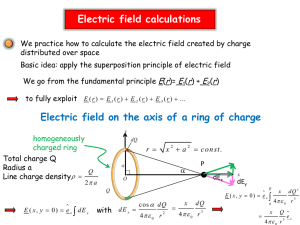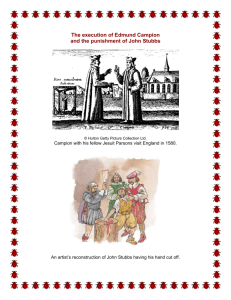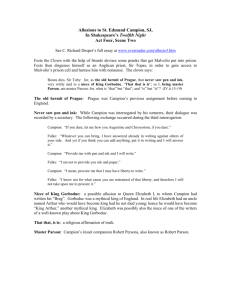Study Questions
advertisement
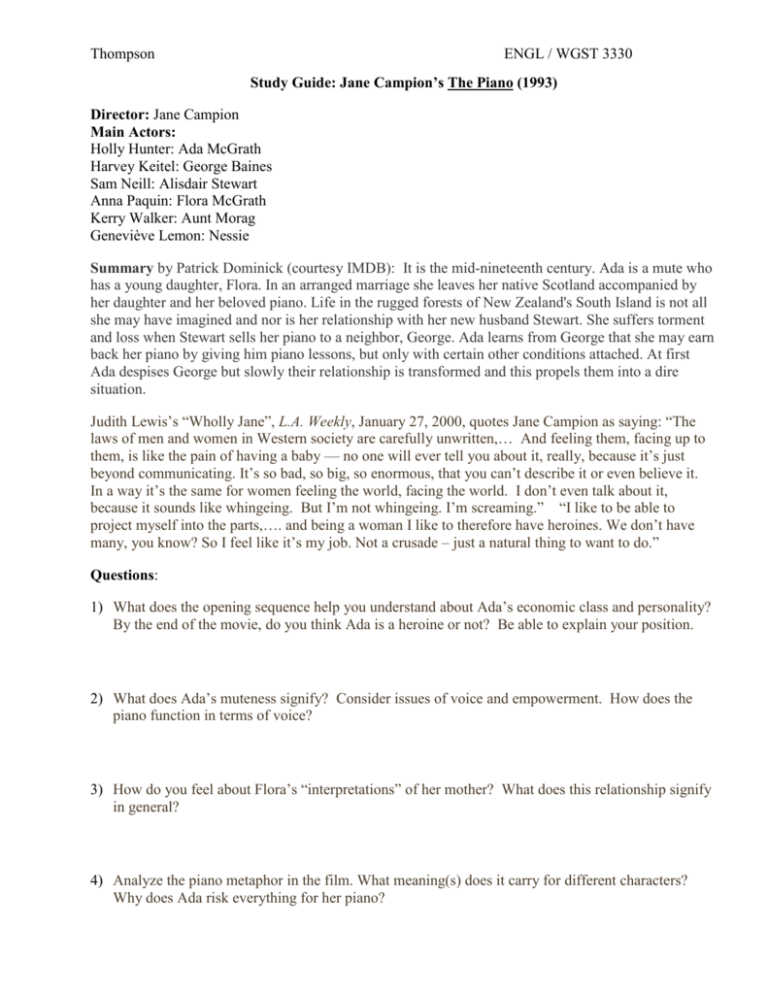
Thompson ENGL / WGST 3330 Study Guide: Jane Campion’s The Piano (1993) Director: Jane Campion Main Actors: Holly Hunter: Ada McGrath Harvey Keitel: George Baines Sam Neill: Alisdair Stewart Anna Paquin: Flora McGrath Kerry Walker: Aunt Morag Geneviève Lemon: Nessie Summary by Patrick Dominick (courtesy IMDB): It is the mid-nineteenth century. Ada is a mute who has a young daughter, Flora. In an arranged marriage she leaves her native Scotland accompanied by her daughter and her beloved piano. Life in the rugged forests of New Zealand's South Island is not all she may have imagined and nor is her relationship with her new husband Stewart. She suffers torment and loss when Stewart sells her piano to a neighbor, George. Ada learns from George that she may earn back her piano by giving him piano lessons, but only with certain other conditions attached. At first Ada despises George but slowly their relationship is transformed and this propels them into a dire situation. Judith Lewis’s “Wholly Jane”, L.A. Weekly, January 27, 2000, quotes Jane Campion as saying: “The laws of men and women in Western society are carefully unwritten,… And feeling them, facing up to them, is like the pain of having a baby — no one will ever tell you about it, really, because it’s just beyond communicating. It’s so bad, so big, so enormous, that you can’t describe it or even believe it. In a way it’s the same for women feeling the world, facing the world. I don’t even talk about it, because it sounds like whingeing. But I’m not whingeing. I’m screaming.” “I like to be able to project myself into the parts,…. and being a woman I like to therefore have heroines. We don’t have many, you know? So I feel like it’s my job. Not a crusade – just a natural thing to want to do.” Questions: 1) What does the opening sequence help you understand about Ada’s economic class and personality? By the end of the movie, do you think Ada is a heroine or not? Be able to explain your position. 2) What does Ada’s muteness signify? Consider issues of voice and empowerment. How does the piano function in terms of voice? 3) How do you feel about Flora’s “interpretations” of her mother? What does this relationship signify in general? 4) Analyze the piano metaphor in the film. What meaning(s) does it carry for different characters? Why does Ada risk everything for her piano? 2 5) Identify the imagery of whiteness and blackness in the film. What does such imagery reveal about colonialism, racism, patriarchy, etc.? What might the imagery reveal about Campion’s understanding of the connection between race, class, and feminism? Explain. 6) Explore the theme of power struggle in the film. What does the New Zealand landscape, with its forests, thick mud, sea and beach, help you understand about this theme? Explain. 7) Why is Ada described as a “mail-order bride”? Why do you think the film puts so much emphasis on buying and selling? What does the film signify about the libidinal economy? 8) Compare the characters of Stewart and Baines in relation to their interactions with Ada, and Flora. What might their interactions reveal about their understandings of libidinal exchange value? What “coin” does Ada use to get what she needs or desires? What does Flora learn about the “economy”? 9) What does “land” mean to Stewart? What does it mean to Baines? What does it mean to the Maori? How does the film represent these different perceptions? 10) Compare Stewart’s house to Baines’s house. What do their two houses reveal about the two men and their class standing? 11) What link does Campion establish between colonialism and patriarchy? Pay close attention to intersections between race, class, and gender in the film. Consider the way colonization and patriarchy interact. 12) What is the symbolic value of Stewart’s cruel punishment of Ada? How does Jane Campion encourage viewers to identify with Ada in this scene? 13) How are we to understand the double ending of the film? Explain your understanding.



